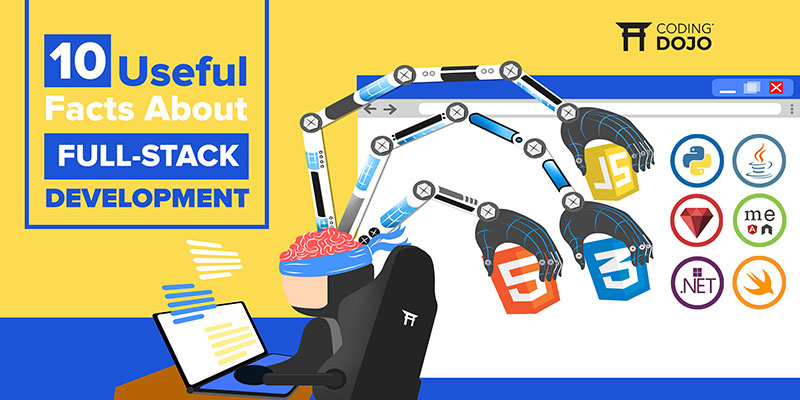“The improvement of understanding is for two ends: first, our increase of knowledge; secondly, to enable us to deliver that knowledge to others.”
–John Locke
Because of the internet and Google, information is literally at our fingertips. Unfortunately, we cannot understand everything that we read, especially when it comes to programming terms. One confusing term the programming world use is full-stack development. Although there are tons of articles explaining what full-stack development is, it’s still difficult to fully understand. So to have a better grasp of what it means, here are 10 useful facts about full-stack development:
What is Full-Stack Development?
Randy Schmidt, the managing director of the Burns & McDonnell Terminals and Pipelines group, was the first to use the term full-stack web developer describing Jason Tremblay, Geoffrey Grosenbach, and Tom Preston-Werner. He described a full-stack developer as someone that does design, markup, styling, and behavior full-stack work/ Since then, various programmers used the term full-stack developer and have given their own definitions.
What do you need to know to become a full-stack developer?
A full-stack developer is a person who is comfortable working in the front-full-stack-end side of web development. It does not mean you have mastered everything about web development; it means that you can work on both the front-end and back-end, with minimal assistance. It’s no wonder that employers look for full-stack developers.
How Many Coding Languages Are There?
Surprisingly, we have lots of programming languages in existence, both those in current use and obsolete ones. Knowing more than one programming language is better, but it’s useless without an in-depth understanding of its concepts and application.
Therefore, you should know the languages that will be required for your stack.
To master the concepts of full-stack development, you need to understand its technical foundations and full-stack frameworks. Spending more time exploring different programming languages can hone your skills, speed up exploring progress and solidify your reputation. We cannot conclude that if you spend ten years of your life studying full-stack development, you’ll become a proficient full-stack developer. In reality, you can achieve the status if you absorb all you’ve learned, apply them impeccably, and create your mark in the web industry through excellent work and contributions. Remember, time, focus, willingness to learn, and perseverance matter.
Regardless of the student’s level of aptitude starting out, the success to master one or multiple programming languages depends on oneself. In Coding Dojo, we believe that anyone can learn to code at their own pace with the right teachers, attitude, and learning environment.
What is Web Development?
Around 1990-2000s, full-stack development was synonymous with web development. This was due to user interfaces being simple and easy to make, developers around this era know how to work on both back-end and front-end projects. Now, web development and full-stack development have their own definition:
- Web Development- a process associated with technology and website development for Internet (public network) and intranet (private network). It involves web design, coding, testing, and writing markup processes, etc.
- Full-Stack Development- a web development process that involves both the front-end and back-end parts of an application.
Web development is like a big tree with many branches; each branch can bear fruit. In full-stack development, those relationships are interconnected. Therefore, full-stack developers may provide a wide range of potential job opportunities and experiences.
How Many Types of Web Developers are There?
You probably know only three kinds of developers: frontend developers, backend developers, and full-stack developers. But actually, there are lots of developers with various specializations. Here’s the list according to Revelo.
It can have many benefits to various potential career paths and disciplines. As a hobby, it’s fun and entertaining. Also, it can be for everyone, whether you’re a grade schooler, a working parent, or a retiree with a diverse background.
How Many Web Developers Are There?
The U.S. Bureau of Labor and Statistics (BLS) estimates that there are around 197,000 web developers in the United States. Although, that number is likely higher considering the variety of different job titles a web developer can have.
What Is the Demand for Full-Stack Developers?
Of course, the tech industry isn’t the only one growing, the demand for jobs such as; web developers, software engineers, and full stack developers also increases. According to the BLS, the profession is expected to grow 20 percent over the next decade.
Why Should You Become a Full-Stack Developer?
Front-end and Back-end development are two essential skills in the tech industry, and knowing both of them could give you an advantage in your career path. You might ask, “why should I need to learn back-end development when I already have a successful career in front-end development?” or vice versa.
Here are some of the advantages and benefits of a full-stack developer:
- Potential for Employability
- Variety of job roles
- Easy to Upgrade
Instead of hiring multiple developers, some companies prefer developers who can multitask. There’s a saying, “two is better than one.” So when you know both front-end and back-end, there’s a higher chance and more potential opportunity to land a job in the tech industry. And based on the project requirement, you can easily switch between back-end and front-end development.
In addition, the more languages you know, the easier for you to learn new ones that can upgrade your skill sets—which may lead to more employment opportunities.
The growth of the tech industry is unstoppable, that’s why the more you know, the more you can contribute to its changes and growth. Not to mention, you have more opportunities to help create a better future—not just for the tech industry, but also for the people around you.
Coding Dojo cannot guarantee employment, salary, or career advancement. Not all programs are available to residents of all states. REQ1919183 3/2023

